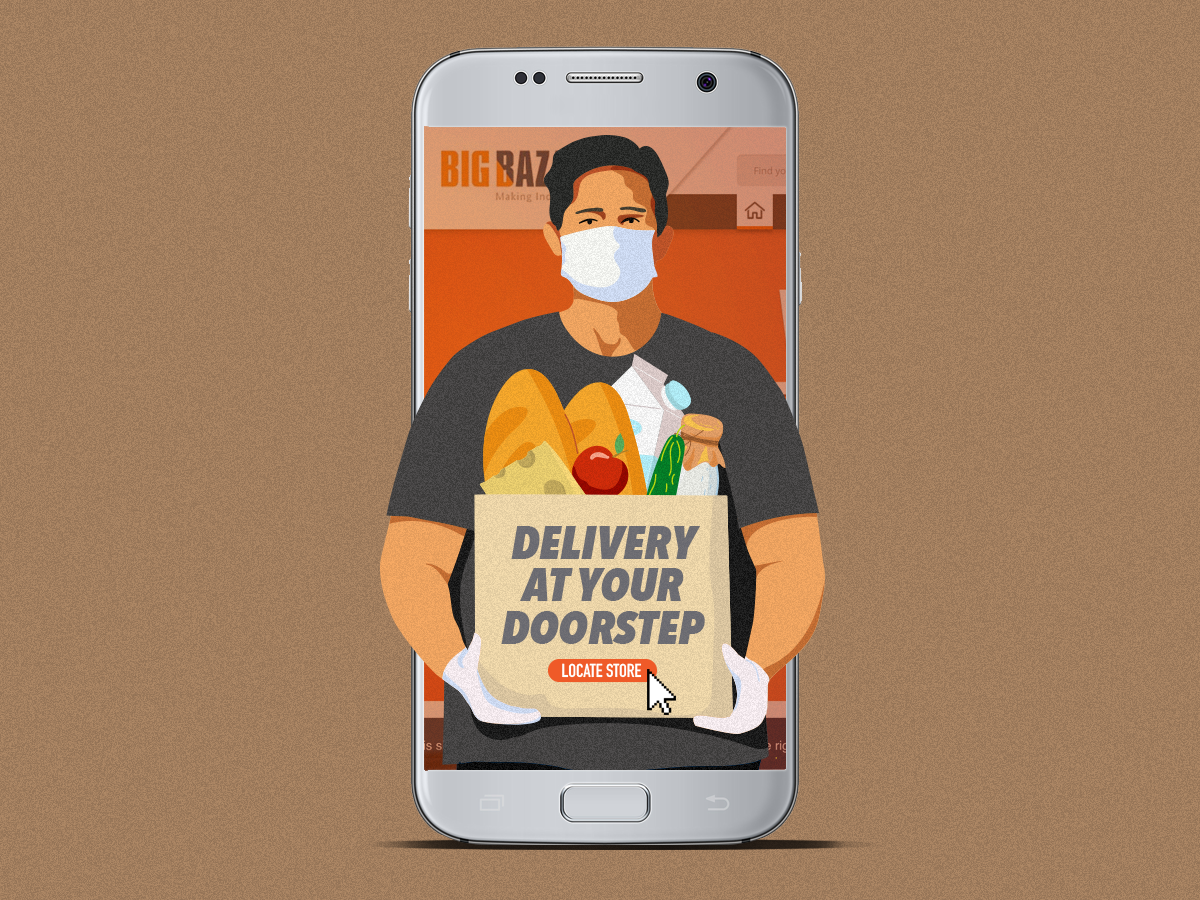
Large format offline retailers and wholesalers, including Future Group, Spencer’s Retail, Metro Cash and Carry and Walmart’s Best Price, have stepped up efforts to service customers online, building omnichannel models to deliver goods and groceries amid a nationwide lockdown that has been extended to May 3.
The move, buoyed by increased demand from customers who are ordering staples and household supplies online in the wake of restrictions imposed due to the Covid-19 pandemic, is a cautious first step from the brick-and-mortar retailers although it is as yet unsure if demand will persist even after the lockdown ends.
Future Group, which serviced online orders for groceries only from its Easy Day stores in Delhi NCR, has extended that capability to 250 of its Big Bazaar stores across the country.
“We were able to launch BigBazaar.com within ten days and since then we’ve scaled it to about 10,000 orders a day,” said Bharati Balakrishnan, Senior VP, Digital Commerce, Future Group.
The group, which received an investment from US e-commerce giant Amazon last year, says it is currently servicing Amazon’s orders, orders through its own website, as well as through phone by its customers.
While it has its own delivery fleet, the retailer is also working with hyper local delivery app Dunzo and logistics player Shadowfax to pick up and deliver orders to homes.
“We’re running online wherever we’re allowed to operate stores. Some of the stores are adopting online orders faster than others,” Balakrishnan said.
Big Bazaar said online or telephonic orders accounted for about 30% of the hypermarket’s sales, even as the bulk of sales continued to be through customers visiting stores even during the lockdown period.
“Yes, it looks on current thinking that customers are going to adapt to shopping omnichannel,” a Big Bazaar spokesperson said.
Kolkata-based Spencer’s Retail has also partnered with internet firms like food delivery platform Swiggy, cab-hailing app Uber and bike taxi startup Rapido to deliver orders placed by customers on its website.
The retailer, which had launched a shopping app two years ago, has partnered with Flipkart, making its inventory visible to shoppers on the Walmart-owned platform in order to service a larger number of out-of-store orders.
“Now, during the lockdown, our OOS (out of store) business has gone up from a low single digit to double digits, thanks to e-commerce and phone orders increasing multiple times,” said Devendra Chawla, CEO of Spencer’s Retail, which operates about 200 supermarkets in various cities.
German wholesaler Metro Cash and Carry India also launched its mobile shopping app earlier this month. Initially, it had planned to pilot the app for members in Bengaluru only, but the Covid-19 pandemic prompted it to roll out the facility nationwide.
“We are already getting more than 100 online orders from traders per store per day across the country,” said managing director Arvind Mediratta. “Otherwise it was zero for us as we didn’t have the app earlier.”
Rival Walmart’s Best Price wholesale store chain revamped its app last month and has also enhanced delivery services to cater to the big jump in delivery orders during the lockdown period.
This is a good time for offline retailers to invest in growing their online presence, said Satish Meena, senior forecast analyst at Forrester Research.
“However, this period might not be long enough for them to gather data that can sway their boards to go all in. At the end of the day, there’s a huge cost attached to selling online,” Meena said.
To be sure, traditional retailers are wary about whether the spate of online orders will continue even after the lockdown.
“We’re chasing incremental revenues and high repeat with our customers,” said Balakrishnan of Future Group. “There are only two things to consider – if the consumer is moving online, we need to move with them, and the second thing is we need to build a viable model.”
Chawla of Spencer’s, too, believes the proportion of online orders will fall once the lockdown is over, but the lessons will be invaluable to chart its omnichannel course in future.
According to Meena of Forrester Research, companies that have a three to five-year view of building an e-commerce model for grocery will succeed.
“All retailers have small teams that are doing e-commerce, maybe now those teams will get more vocal. But I don’t think we can make it a generalisation that all retailers will jump online, it will depend on the maturity and whether they’re willing to make those three- or five-year investments that are needed,” he added.
Leave a Reply